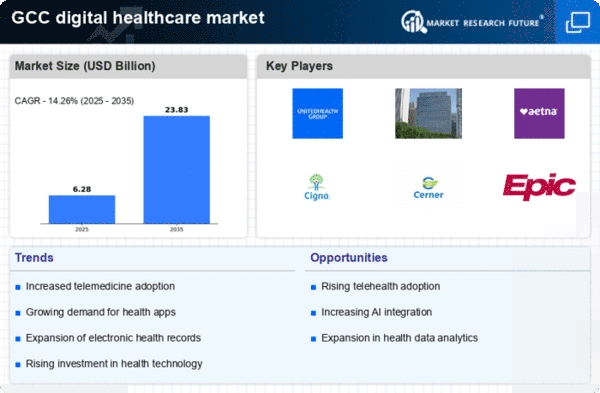The GCC Digital Healthcare Market has witnessed significant growth and transformation in recent years, driven by technological advancements and the increasing demand for efficient healthcare solutions. As governments in the region strive to enhance healthcare delivery systems and improve patient outcomes, a variety of players have entered the digital health space, leading to competitive dynamics that shape the market. The landscape is characterized by a blend of established healthcare providers, innovative startups, and technology giants, all of which are focused on utilizing digital tools to streamline operations, enhance patient engagement, and provide comprehensive care solutions.
This competitive environment not only fosters innovation but also encourages collaborations and partnerships aimed at leveraging technology to address specific healthcare challenges prevalent in the region.DabaDoc has established a strong foothold in the GCC Digital Healthcare Market by offering a suite of solutions designed to facilitate patient-provider interactions. The company is known for its user-friendly platform that aids in appointment management, telemedicine, and secure communication between healthcare professionals and patients. Its strengths lie in its ability to adapt to the unique healthcare needs of the region, providing services that enhance accessibility and patient satisfaction.
DabaDoc's commitment to integrating local regulatory requirements into its solutions further reinforces its market presence. In an environment where patient-centered care is becoming increasingly important, DabaDoc's focus on improving operational efficiency while enhancing the patient experience positions it favorably against competitors.Cerner Corporation, a prominent player in the GCC Digital Healthcare Market, offers a comprehensive range of products and services that cater to the needs of healthcare organizations. Its key solutions encompass electronic health records, population health management, and revenue cycle management, all designed to improve clinical workflows and decision-making processes.
Cerner's strength lies in its robust technology infrastructure, which supports interoperability between various healthcare systems, thereby facilitating seamless data sharing and collaboration. The company has made strategic acquisitions to bolster its presence in the region, enabling it to offer innovative solutions that align with local healthcare priorities. Cerner's commitment to training and support ensures that healthcare professionals can effectively utilize its technologies, thereby enhancing overall healthcare delivery in the GCC. This combination of comprehensive services, strategic growth initiatives, and a focus on local needs make Cerner an influential entity in the region's digital healthcare landscape.










